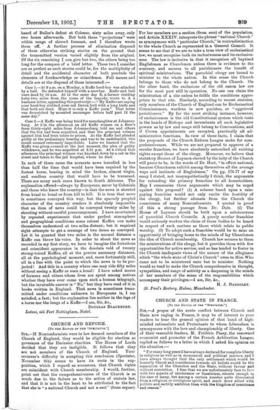CHURCH AND REFORM.
[To ma EDITOR Or THB "SPIWUTOR.1
SIH,—If Nonconformists were in law deemed members of the Church of England, they would be eligible for election as governors of the Ilminster charities. The House of Lords decided that they are ineligible. It follows that they are not members of the Church of England. Your reviewer's difficulty in accepting this conclusion (Spectator, November 8th) seems to have its roots in the sup- position, which I regard as erroneous, that Church rights are coincident with Church membership. I would, further, Point out that the comprehensiveness of the Church is as much due to the failure as to the action of statute law, and that it is not in the least to be attributed to the fact that she is "a national Church and not a sect" (from sequor), For her members are a section (from sew) of the population, and Article =PT. interprets the phrase "national Church" as synonymous with "particular Church," in contradistinction to the whole Church as represented in a General Council. It seems to me that if we are to take a true view of ecclesiastical law, we must recognise both its inclusiveness and its exclusive- ness. The law is inclusive in that it recognises all baptised Englishmen as Churchmen unless there is evidence to the contrary, and secures to all parishioners the benefit of spiritual ministrations. The parochial clergy are bound to minister to the whole nation. In this sense the Church belongs to those who do not belong to the Church. On the other hand, the exclusions of the old canon law are for the most part still in operation. No one can claim the ministration of a rite unless he fulfils the conditions appro- priate to that rite. Similarly, according to recent statutes, only members of the Church of England can be Ecclesiastical Commissioners, wardens in new parishes, or "aggrieved parishioners." By far the most striking instance, however, of exclusiveness is the old Constitutional system which vests in the hands of Bishops and incumbents all such legislative powers as by law and usage still belong to Convocations, and if Crown appointments are excepted, practically all ad- ministrative functions. In view of these facts, I claim that the proposals of the Church Reform League make for com- prehensiveness. While we are not prepared to approve Of a secular franchise, we leave absolutely untouched all existing rights except those of the clergy. Moreover, we believe that statutory Houses of Laymen elected by the laity of the Church will prove to be, in the words of Dr. Hort, "in effect national, because Churchmen exhibit among themselves all the average ways and instincts of Englishmen." On pp. 176-77 of my essay I stated, not unsympathetically I think, the arguments for extending the primary franchise to all householders. May I summarise three arguments which may be urged against this proposal? (1) A scheme based upon a rate- paying franchise would not only excite the hostility of the clergy, but further alienate from the Church the consciences of many Nonconformists. I quoted in proof of this a strong passage from Dr. Dale. (2) The House of Laymen should be built upon a substructure of parochial Church Councils. A purely secular franchise would seriously weaken the claim of these bodies to be heard in respect of such matters as those which relate to public worship. (3) To adopt such a franchise would be to miss an opportunity of bringing home to the minds of lay Churchmen the idea of Church membership. Church law secures to them the ministrations of the clergy, but it provides them with few opportunities for active service, and so has tended to foster in the Church inadequate views of the nature of the allegiance which "the whole state of Christ's Church" owes to Him Who came not to be ministered unto but to minister. Nothing would so tend to make the Church comprehensive in thought, sympathies, and range of activity as a deepening in the minds of her members of the sense of the responsibilities which accompany their privileges.—I am, Sir, &c.,
H. J. BARDSLICY. St. Paurs Rectory, Hulme, Manchester,


















































 Previous page
Previous page